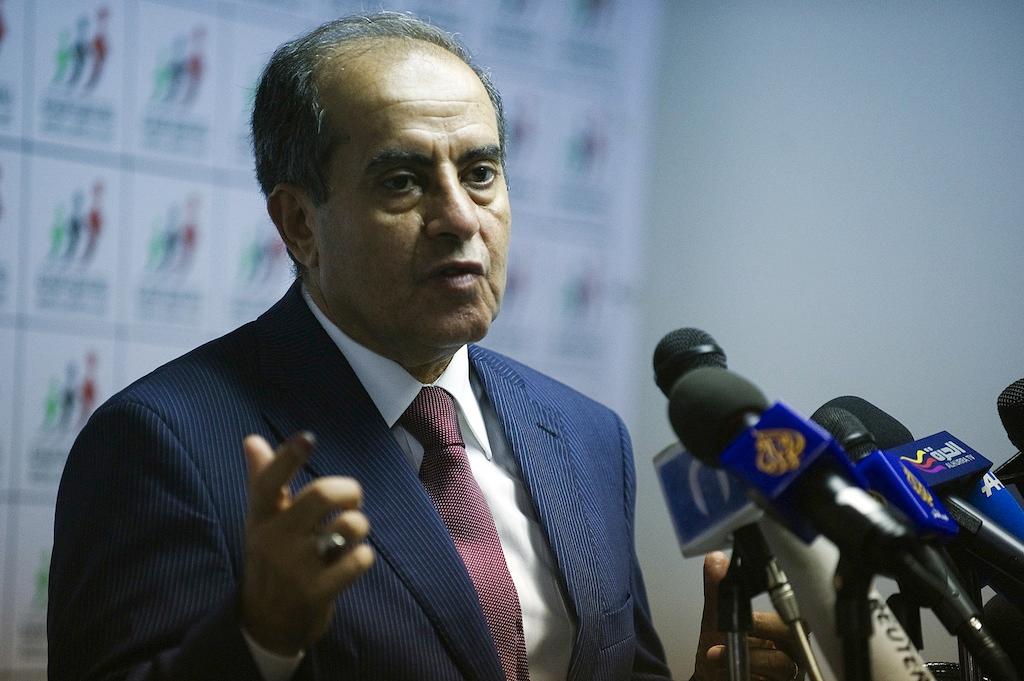Libya election results: Jibril leads, but Islamists say not beaten
National Forces Alliance leader Mahmud Jibril gives a press conference at the Alliance headquarters in Tripoli, on July 8, 2012. Liberals claimed an early lead today in vote counting across the country after Libya held its first free elections following Moamer Kadhafi’s ouster, winning plaudits from the international community.
TRIPOLI, Libya – Libya's wartime prime minister Mahmoud Jibril extended his lead in landmark elections, vote tallies showed on Wednesday, but Islamist rivals predicted their score would be boosted by allied independent candidates.
Jibril's National Forces Alliance headed for a landslide win in the eastern district covering the towns of Tobruk and Derna, seen as a hardline Islamist stronghold, suggesting his support was broader than urban areas such as the capital Tripoli.
However Western-educated Jibril's gains do not automatically translate into dominance of the 200-seat national assembly which is set to choose a prime minister and cabinet before setting the stage for full parliamentary elections in 2013.
Candidates on party lists have only been allotted 80 seats, meaning they will be outnumbered by independent candidates whose allegiances are hard to pin down.
"With our own numbers we are almost certain that we have the majority in the independent seats," said Mohammed Sawan, the head of the Justice and Construction Party, the political wing of Libya's Muslim Brotherhood.
"Maybe the final result will show that Justice and Construction is the leading party," he told Reuters.
Libya's first free national vote in six decades has been hailed as a success by observers despite election-day violence that claimed at least two lives.
Analysts say Jibril has benefited from his prominence as one of the main figures of last year's uprising to end 42 years of dictatorship under Muammar Gaddafi, and is perceived by many Libyans as a safe pair of hands for rebuilding the economy.
He was also leading in Sabha, the main town of the south. Justice and Construction led in the central town of Shati – one of the few areas where Jibril's alliance did not stand.
Many of the candidates of Justice and Construction were either less well known or were hamstrung by local perceptions that their party has ties with Egypt's Muslim Brotherhood, clashing with a strong local sense of national sovereignty.
The Libyan Muslim Brotherhood has always denied formal links with its Egyptian counterpart but has not been able to shake off a local belief that the two have close affiliations.
Jibril, widely perceived as a moderate, rejects the labels of liberal and secular in a religiously conservative country where Islamic values are integral to the political debate.
Independent candidate Abu Bakr Abdel-Gader told Reuters he had been approached by Justice and Construction and offered a position in the party – an offer he turned down.
"I refused to join the JCP. I didn't fight a revolution and carry bloodied martyrs from the front line for Islamists to take over and close us off from the world again," he said. "Libyans are ready to experience democracy and only educated liberals with a world view can bring it."
Party strategists contacted by Reuters on Wednesday declined to give estimates of how many seats they expected to have in the assembly, saying they could have a better idea later in the day.
The national election commission initially said it would have preliminary results ready by Wednesday but even partial votes for the majority of districts in Tripoli or the second city, Benghazi, have not been released.
Libya's economy, brought to its knees during last year's civil war, will more than double this year as oil production recovers to pre-uprising levels, the International Monetary Fund (IMF) forecast on Tuesday.
Growth next year is likely to slow to a still healthy 16.5 percent and 13.2 percent in 2014 as the effects of the war on the economy wane, the IMF added.
But the country remains riven by regional and tribal tensions and is awash with guns after the conflict.
A stand-off between the Western Region towns of Misrata and Bani Walid continued after the kidnapping this week in Bani Walid – a former Gaddafi stronghold – of two local TV reporters who work for the Misrata-based Tobacts TV station.
Reporters Without Borders said their captors have reportedly demanded the release of detainees in Misrata in return for freeing the two journalists. Libyan Deputy Prime Minister Mustafa Abu Shagour demanded their immediate release.
Local Al-Assama television quoted Bani Walid military chief Salim Al-Waar as saying he would guarantee the reporters' safety and return them to Misrata at some point in the future.
Militia fighters in Misrata had initially threatened to enter Bani Walid to forcibly liberate the two reporters. But Al-Assama quoted the local military chief in Misrata as saying he had ordered fighters to hold back from any such action for now.
(Additional reporting by Hadeel Al-Shalchi and Ali Shuaib in Tripoli; Writing by Mark John; Editing by Myra MacDonald)
The story you just read is accessible and free to all because thousands of listeners and readers contribute to our nonprofit newsroom. We go deep to bring you the human-centered international reporting that you know you can trust. To do this work and to do it well, we rely on the support of our listeners. If you appreciated our coverage this year, if there was a story that made you pause or a song that moved you, would you consider making a gift to sustain our work through 2024 and beyond?
